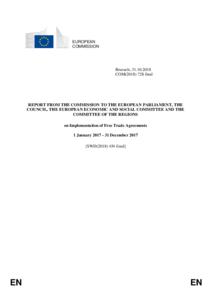
Report from the Commission to the EP, the Council, the European Economic and Social Committee and the Committee of Regions on Implementation of Free Trade Agreements 1/1/2017-12/31/2017
European Commission.
Bilateral and regional free trade agreements (FTAs) are major drivers of economic growth. Through harnessing globalisation, they bring important benefits for the people and companies in the European Union (EU) and in our partner countries. FTAs are major contributors to the EU's external trade performance as they open up new markets for exporters and offer a more predictable, rules-based business environment beneficial to consumer choice and competition. While removing tariffs and behind- the- border non-tariff barriers remain key features of trade agreements, other elements are gaining in importance. In particular, rules supporting free and fair trade (e.g related to IPR protection and competition rules), but also rules protecting labour rights and the environment have come to the fore. In addition, some FTAs may offer an opportunity for closer cooperation between the parties on a range of issues, from research and innovation to standardisation and climate change.
As the number of trade agreements concluded by the EU has been increasing, so has public interest in their impacts. To analyse the real and potential benefits of major trade agreements4, the Commission itself in its "Trade for All" Communication5 committed to take stock annually on how these agreements are being implemented, shedding light on progress but also the challenges that remain and the steps the Commission is taking so that FTAs can reach their full potential.
In line with the first report6 published in November 2017 this second Annual Report on FTA Implementation (hereinafter: "the report") is meant to increase awareness and transparency on how the Commission implements FTAs. The report should enable the other EU institutions, EU Member States, civil society, business and everyone with a stake in EU trade policy to scrutinise and debate how the EU is applying its FTAs. The information gathered through this exercise will also inform future trade negotiations. In addition, the report also provides useful insights about the extent to which developing countries are benefitting from FTAs with the EU, and on how to better tailor development assistance in line with the newly updated Aid-for-Trade strategy.